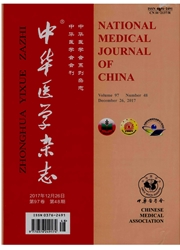

 中文摘要:
中文摘要:
目的鉴定1例Ph染色体阳性的急性混合细胞白血病(AMLL)患者携带的变异型BCR/ABL融合基因,观察伊玛替尼治疗的疗效。方法联合使用形态学、免疫分型、细胞遗传学和基因分析确定患者的变异型BCR/ABL融合基因,使用伊玛替尼治疗并定量检测该融合基因。结果患者人院时检查Ph染色体阳性,荧光定量PCR未见BCR/ABL融合基因。形态学检查原始粒细胞比例0.66,免疫分型发现髓系和B系两群幼稚细胞。患者经化疗和骨髓移植疗效不佳,进一步检测发现新的变异型BCR/ABL融合基因(GenBank:EF423615),该融合蛋白较常见的BCR—ABL b2a2型缺失10个氨基酸并伴H893Q变异。遂用伊玛替尼治疗并迅速获得缓解,变异型融合基因表达量逐渐降低,5个月后转阴性。治疗中患者曾停药,变异型融合基因转为阳性,再次用药后又转为阴性。现患者已持续缓解12个月,生存状况良好。结论变异型BCR/ABL融合基因可能和患者的特殊临床表现有关,使用伊玛替尼治疗获得了很好的疗效。
 英文摘要:
英文摘要:
Objective To identify the novel BCR/ABL transcript in a patient with acute mixed lineage leukemia (AMLL) , and to evaluate the imatinib treatment response by quantitatively monitoring the aberrant BCR/ABL. Methods Specimens of peripheral blood and bone marrow were obtained. By using several detect protocols, we found a novel BCR/ABL transcript in a patient with Ph-positive AMLL. The patient was treated with imatinib and the aberrant BCR/ABL was quantitatively monitored to evaluate the clinical response. Results On admission, cytogenetic analysis showed Philadelphia-chromosome (Ph) positive in the specimens, but BCR/ABL ela2, b2a2, and b3a2 were negative. Morphological analysis of the bone marrow showed the myeloid blast cells accounted for 66% , and immunophenotyping analysis showed 2 groups of aberrant blast cells: myeloid and B lineage. Chemical therapy and bone marrow transplantation failed to control the disease, and a novel BCR/ABL transcript ( GenBank : EF423615) was found by using several detection protocols. The novel fusion protein showed a deletion of 10 amino acids and H893Q compared with the common BCR/ABL b2a2 fusion protein. The patient was then treated with imatinib and hematological remission was soon achieved, and 5 months after the imatinib treatment the quantity of the aberrant BCR/ABL was gradually decreased to negative. During the treatment the patient had discontinued the drug once and just then the aberrant BCR/ABL became positive soon. Imatinib was administered again and molecular remission was soon achieved for the second time. By continued therapy with imatinib, the patient got sustained and complete molecular remission lasting 12 months so far. Conclusion The aberrant BCR/ABL may contribute to the clinical features of AMLL and the AMLL patients that have aberrant BCR/ ABL may be sensitive to imatinib.
 同期刊论文项目
同期刊论文项目
 同项目期刊论文
同项目期刊论文
 期刊信息
期刊信息
